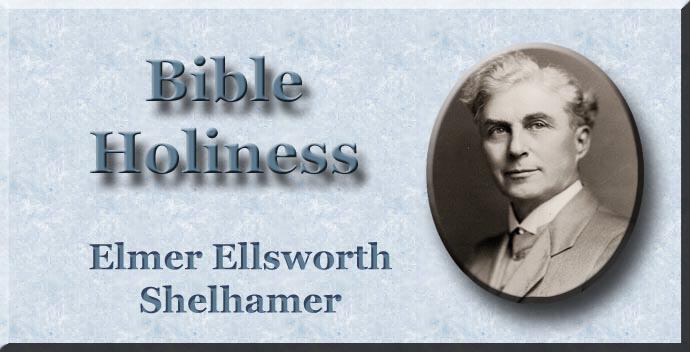
Bible Holiness
By Elmer Ellsworth Shelhamer
Chapter 16
DEATH TO CARNALITY -- No. 3
Let us notice a few more plain passages which teach or infer death to self. "Then shall ye remember your own evil ways, and your doings that were not good, and shall loathe yourselves in your own sight for your iniquities and for your abominations" (Ezek. 36:31). "Verily, verily, I say unto you, Except a corn of wheat fall into the ground and die, it abideth alone: but if it die, it bringeth forth much fruit. He that loveth his life shall lose it; and he that hateth his life in this world shall keep it unto life eternal" (John 12:24, 25). 'Knowing this, that our old man is crucified with Him, that the body or sin might be destroyed, that henceforth we should not serve sin" (Rom. 6:6). The trial and crucifixion of Jesus was in many respects similar to the crucifixion of our "old man." Let us consider it. It was only a few days previous to His betrayal that the multitudes cried, "Hosanna in the highest." In like manner souls are often the most ecstatic and triumphant just before the light shines upon them revealing the fact that they are still carnal. It seems the Lord prepares them to receive the startling message. He began to be "exceedingly sorrowful" and said His "hour had come." In like manner the soul who gets a sight of his heart as Job did will "exceedingly fear and quake," and feel the crisis in his life has come; it means to get rid of these tendencies or succumb to them. Next, we find them witnessing against Him and condemning Him to death. When judgment light begins to pour in on the "old man," various unkind and unclean actions that have been indulged in in the past, come up as witnesses to testify that "It was this old nature that caused it," and now it must die. Confession is not the crucifixion, it is simply the trial. After they had unanimously condemned Him to death, they started for Calvary, but He was so weak through fasting and loss of sleep that He fainted under the cross. Many have experienced something similar, but though "faint yet pursuing" their enemies, supernatural strength was given until they felt they were able to overtake them and "beat them small as the dust." Next we see Him on the cross suffering the lingering death of crucifixion. After He had hung there several hours, He said, "I thirst," and just before the death struggle, He cried with a loud voice and said, "My God, my God, why hast Thou forsaken me?" Finally he said, "It is finished," and bowed His head and gave up the ghost. Those who have really been "crucified with Christ" know in a sense how He felt when He said, "I thirst." They also know what it is to feel that even God has left them alone to grapple with the reinforced powers of unbelief and discouragement. This seems to be the last mighty battle to be fought. But even after a soul has gone thus far, he can "come down from the cross" and "save himself," If he will. Those who will not listen a moment to mental depression, physical suffering, and carnal reasonings will shortly be able to say with Jesus, "It is finished," the carnal mind is slain, and my heart is cleansed from all unrighteousness. Hallelujah! If burdened souls were left to follow the leadings of the Spirit, even in those meetings where they are taught to consecrate for holiness, they would invariably strike the line of confession, and this would bring them to the point of crucifixion, where the blood is applied and the witness given. |
|
 |
 |
|
|
|
-
Site Navigation
 Home
Home What's New
What's New Bible
Bible Photos
Photos Hiking
Hiking E-Books
E-Books Genealogy
Genealogy Profile
Free Plug-ins You May Need
Profile
Free Plug-ins You May Need
 Get Java
Get Java.png) Get Flash
Get Flash Get 7-Zip
Get 7-Zip Get Acrobat Reader
Get Acrobat Reader Get TheWORD
Get TheWORD